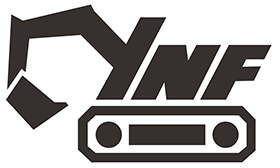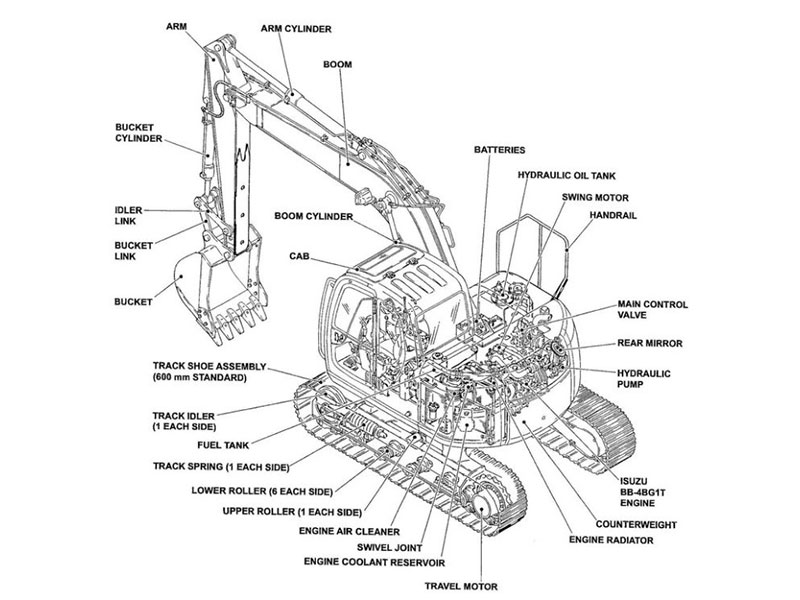
Maintaining your excavator is crucial for optimal performance and longevity. Regular upkeep of excavator spare parts ensures operational efficiency and prevents unexpected breakdowns. By adopting effective maintenance practices, you can save thousands of dollars in repairs and replacements. Preventive maintenance plays a key role in reducing unscheduled downtime, improving resource planning, and keeping projects on schedule. This proactive approach not only extends the lifespan of your equipment but also enhances safety for operators and workers. Embrace these strategies to maximize the reliability and cost-effectiveness of your excavator.
Key Takeaways
Regular daily checks of fluid levels and visible wear can prevent costly mechanical failures and ensure smooth operation.
Implement a structured maintenance program that includes weekly and monthly inspections to catch issues early and maintain efficiency.
Create and follow a detailed maintenance checklist to ensure all critical components are regularly inspected and serviced.
Address hydraulic issues promptly by inspecting for leaks and maintaining optimal fluid levels to avoid operational disruptions.
Routine maintenance not only extends the lifespan of your excavator but also enhances safety for operators and workers on site.
Keep detailed maintenance logs to track the condition of your excavator and plan future maintenance tasks effectively.
Embrace preventive maintenance to maximize productivity, reduce downtime, and save on repair costs.
Preventive Maintenance Tips for Excavator Spare Parts

Regular maintenance of your excavator is essential to ensure its longevity and optimal performance. By following a structured excavator maintenance programme, you can prevent costly repairs and downtime. Here are some valuable maintenance tips to keep your excavator in top shape.
Daily Checks for Excavator Maintenance
Inspect fluid levels and refill as necessary.
Check the engine oil, coolant, and hydraulic fluid levels daily. Keeping these fluids at the correct levels ensures smooth operation and prevents overheating or mechanical failures.Check for visible wear and tear on parts.
Examine the excavator for any signs of damage or wear, such as cracks, rust, or loose bolts. Addressing these issues promptly can prevent more significant problems down the line.
Expert Testimony:
“Keeping up with daily and preventive maintenance practices can help extend your excavator’s working life.”
Weekly Checks in Excavator Maintenance Programme
Examine hydraulic systems for leaks.
Inspect hoses, fittings, and cylinders for any signs of leakage. Leaks can lead to reduced efficiency and potential damage to the hydraulic system.Test the functionality of electrical components.
Ensure that all lights, switches, and gauges are functioning correctly. Faulty electrical components can lead to operational issues and safety hazards.
Expert Testimony:
“Effective excavator maintenance requires regular inspections and quick responses to problems. This proactive strategy prevents unnecessary downtime, keeping the excavator trustworthy for any task.”
Monthly Checks for Regular Excavator Maintenance
Conduct a thorough inspection of the undercarriage.
The undercarriage supports the entire weight of the excavator and is prone to wear. Regular inspections help identify issues early, preventing costly repairs.Review and update maintenance logs.
Keep detailed records of all maintenance activities. This practice helps track the condition of the excavator and plan future maintenance tasks effectively.
Expert Testimony:
“If your undercarriage has issues, your excavator won’t be going anywhere, and as you know undercarriage repairs and parts can be expensive.”
By adhering to these maintenance tips, you can ensure that your excavator remains reliable and efficient. A well-maintained excavator not only performs better but also lasts longer, providing you with a better return on investment.
Essential Checklists for Excavator Maintenance

Creating a structured maintenance checklist is vital for keeping your excavator in peak condition. Regular inspections and upkeep prevent costly repairs and ensure the machine operates efficiently. Here’s how you can maintain your excavator effectively.
Inspection Checklist for Excavator Spare Parts
List of critical components to inspect regularly.
Regularly check essential parts like the hydraulic system, engine, undercarriage, and attachments. Pay attention to hoses, seals, and filters, as these components are prone to wear and tear. Identifying issues early can prevent major breakdowns.Steps for conducting a comprehensive inspection.
Begin with a visual inspection of the entire excavator. Look for signs of leaks, rust, or damage. Test the functionality of all controls and systems. Ensure that all safety features are operational. Document any findings and address them promptly.
Expert Tip:
“A thorough inspection checklist helps you catch potential problems before they escalate, saving time and money.”
Maintenance Checklist for Excavator Engine Parts
Routine tasks to perform for upkeep.
Regularly change the engine oil and replace air and fuel filters. Check the coolant level and inspect belts and hoses for signs of wear. Lubricate moving parts to reduce friction and extend their lifespan.Tools and materials needed for maintenance.
Keep a set of basic tools handy, including wrenches, screwdrivers, and pliers. Stock up on essential materials like oil, filters, and lubricants. Having these on hand ensures you can perform maintenance tasks without delay.
Expert Tip:
“Following a consistent maintenance plan keeps your excavator running smoothly and reduces the risk of unexpected failures.”
By adhering to these checklists, you ensure your excavator remains reliable and efficient. A well-maintained machine not only performs better but also lasts longer, providing a better return on investment. Implementing a comprehensive maintenance plan is key to maximizing the lifespan and performance of your equipment.
Common Maintenance Challenges and Solutions in Excavator Maintenance
Maintaining your excavator involves addressing various challenges that can arise over time. Understanding these issues and knowing how to tackle them ensures your machine remains in peak condition. Here, we explore common maintenance challenges and provide practical solutions.
Identifying Wear and Tear in Excavator Couplings
Excavator couplings play a crucial role in power transmission. Over time, they can show signs of wear and tear, which, if left unchecked, can lead to significant operational issues.
Signs of wear and how to address them.
Visual Inspection: Regularly inspect the couplings for visible signs of wear, such as cracks or deformation. These signs indicate that the coupling may not be functioning optimally.
Performance Monitoring: Pay attention to any unusual noises or vibrations during operation. These could signal that the coupling is wearing out.
Immediate Action: If you notice any of these signs, take immediate action. Replace worn couplings to prevent further damage to the excavator.
Expert Insight:
“Regular checks and timely replacements of worn parts are essential to maintain the efficiency of your excavator.”
Replacement guidelines for worn parts.
Select Quality Parts: Choose high-quality replacement parts that match the specifications of your excavator. This ensures compatibility and longevity.
Follow Manufacturer Instructions: Adhere to the manufacturer’s guidelines for installation. Proper installation is crucial for the optimal performance of new parts.
Schedule Regular Replacements: Establish a routine replacement schedule based on usage and wear patterns. This proactive approach minimizes downtime.
Dealing with Hydraulic Issues in Hydraulic Cylinder Seal Kits
Hydraulic systems are vital for the operation of excavators, especially when using hydraulic attachments like hydraulic breakers. Maintaining these systems is crucial to avoid failures.
Common hydraulic problems and fixes.
Leaking Hydraulic Fluid: Inspect for visible leaks around the hydraulic cylinder seal kits. Replace faulty seals promptly to prevent fluid loss.
Weak or Slow Movements: If you notice weak or slow movements in hydraulic attachments, check fluid levels and replace filters if necessary. Persistent issues may require professional consultation.
Regular Fluid Checks: Maintain optimal fluid levels to ensure efficient operation of hydraulic breakers and other attachments.
Expert Tip:
“Addressing hydraulic issues promptly prevents costly repairs and ensures your excavator operates smoothly.”
Preventive measures to avoid hydraulic failures.
Routine Inspections: Conduct regular inspections of hydraulic hoses and fittings. Look for signs of wear or damage and replace components as needed.
Use Quality Fluids: Always use high-quality hydraulic fluids recommended by the manufacturer. This reduces the risk of contamination and extends the life of the system.
Implement a Maintenance Schedule: Follow a structured maintenance schedule that includes regular checks and servicing of hydraulic systems. This proactive approach helps prevent unexpected failures.
By understanding these common challenges and implementing effective solutions, you can ensure your excavator remains reliable and efficient. Regular maintenance not only enhances performance but also extends the lifespan of your equipment, providing a better return on investment.
Benefits of Regular Excavator Maintenance
Regular excavator maintenance offers numerous advantages that contribute to the longevity and performance of your equipment. By adhering to a structured maintenance schedule, you can ensure that your excavator spare parts remain in excellent condition, reducing the likelihood of unexpected breakdowns and costly repairs.
Longevity of Excavator Spare Parts
How maintenance extends the life of spare parts.
Routine maintenance plays a crucial role in extending the lifespan of excavator spare parts. By regularly inspecting and replacing worn components, you prevent minor issues from escalating into major problems. This proactive approach helps maintain the integrity of your excavator, ensuring it operates at optimum performance. Regular checks on hydraulic fluid, engine oil, and coolant levels can reveal early signs of wear or contamination, allowing you to address these concerns before they lead to mechanical failures.
Expert Insight:
“Proper maintenance practices increase equipment lifespan by addressing minor issues early and preventing major breakdowns.”
Cost savings from reduced downtime.
Regular excavator maintenance significantly reduces downtime, which translates into cost savings. By keeping your equipment in top condition, you minimize the risk of unexpected breakdowns that can halt operations and lead to substantial financial losses. A well-maintained excavator ensures operational continuity, allowing you to complete projects on schedule and within budget.
Statistical Data:
Predictive maintenance saves industries $600 billion annually, highlighting the financial benefits of a proactive maintenance approach.
Enhanced Performance of Excavator
Improved efficiency and reliability.
Regular maintenance enhances the efficiency and reliability of your excavator. By ensuring that all components function correctly, you optimize the machine’s performance, leading to smoother operations and increased productivity. Regular inspections and timely replacements of vital spare parts keep your excavator running smoothly, reducing the need for corrective maintenance.
Expert Tip:
“A scheduled maintenance program can extend the lifespan of your machine by monitoring the wear and tear of parts and components.”
Safety benefits from well-maintained equipment.
Maintaining your excavator through regular service not only improves performance but also enhances safety. Well-maintained equipment reduces the risk of accidents caused by faulty parts or systems. By conducting routine maintenance, you ensure that all safety features are operational, protecting both operators and workers on site.
Expert Testimony:
“Regular maintenance helps identify potential issues, prevents breakdowns, reduces repair costs, and ensures the safety of operators and workers.”
By embracing regular excavator maintenance, you maximize the reliability and cost-effectiveness of your equipment. This proactive approach not only extends the life of excavator spare parts but also enhances the overall performance and safety of your machinery.
Regular maintenance of your excavator is essential for preventing costly breakdowns and ensuring long-term efficiency. By adhering to a scheduled maintenance programme, you can identify potential issues early and avoid unexpected breakdowns. This proactive approach not only extends the lifespan of your excavator but also enhances safety and operational reliability. Embrace preventive measures to maximize productivity and minimize repair costs. Consistent upkeep ensures your excavator remains a valuable asset, reducing downtime and keeping projects on track.
FAQ
What are some tips to keep an excavator running smoothly?
To ensure your excavator operates efficiently, inspect it before and after each use. Regularly check fluid levels and clean the machine after every operation. Follow the maintenance schedule recommended by the manufacturer. These steps help maintain the excavator’s performance and extend its lifespan.
How can regular maintenance help in keeping an excavator in optimal condition?
Regular maintenance is crucial for your excavator’s optimal performance and longevity. By adhering to a structured maintenance schedule, you can address issues promptly and implement effective repair practices. This approach maximizes the productivity and reliability of your excavator, ensuring it remains a valuable asset.
What are some essential tasks included in excavator maintenance?
Excavator maintenance involves frequent inspections and preventive actions to avoid downtime. Key tasks include checking and replacing engine oil and coolant, maintaining the hydraulic system, and cleaning the undercarriage. These tasks ensure your excavator remains in top condition and operates efficiently.
Why is regular maintenance necessary for excavators?
Regular maintenance keeps your excavator working as it should. It ensures better fuel efficiency, higher productivity, and lower operating costs. By reducing equipment failure rates, you can maintain a smooth workflow and avoid costly repairs.
What are some key points to consider in excavator maintenance?
Routine excavator maintenance involves inspecting attachments, checking the undercarriage, and cleaning the cab. You should also check oil and coolant levels, inspect the water and fuel separator, test the seat belt, inspect hydraulic hoses, and grease all pivot points. These steps help maintain the excavator’s efficiency and safety.
What are the fundamental aspects of maintaining an excavator?
Maintaining an excavator requires checking the engine, hydraulic system, tracks or wheels, and attachments. You should also monitor wear components, gauges, warning lights, and safety features. Regular lubrication and cleaning are essential to keep the excavator in optimal condition.
What actions are required for maintaining excavator operation?
To maintain excavator operation, conduct periodic inspections and replace worn parts, fluids, and filters timely. Check engine oil quality and level, inspect hydraulic systems for leaks and pressure drops, and examine the undercarriage and attachments for wear and damage. These actions ensure the excavator remains reliable and efficient.
Why is effective maintenance management crucial for an excavator?
Effective maintenance management ensures your excavator’s operational reliability and extends its service life. It enhances project efficiency and safety, prevents downtime, and minimizes repair costs. By managing maintenance effectively, you can maximize the excavator’s performance and value.
What is the importance of establishing a maintenance schedule for an excavator?
Establishing a maintenance schedule for your excavator is important to alternate between preventive checks and corrective actions. This ensures the machine remains efficient and safe, reducing the risk of unexpected breakdowns and costly repairs.
How can one start building a preventive maintenance plan for an excavator?
Start building a preventive maintenance plan by learning the ins and outs of your machine. Develop a regular maintenance schedule to reach the excavator’s peak longevity. This proactive approach helps maintain the excavator’s performance and extends its lifespan.





